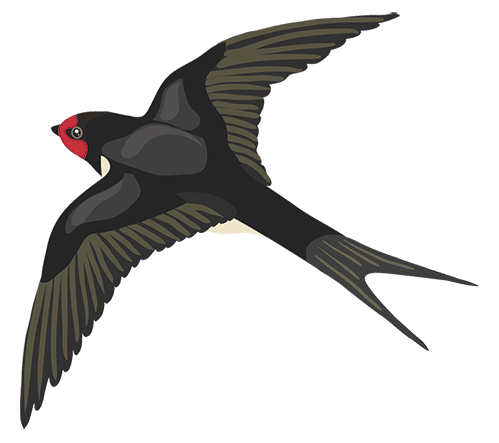
This image has format transparent PNG with resolution 499x443.
You can download this image in best resolution from this page and use it for design and web design.
Swallow PNG with transparent background you can download for free, just click on download button.
The swallows and martins, or Hirundinidae, are a family of passerine birds found around the world on all continents except Antarctica. Highly adapted to aerial feeding, they have a distinctive appearance. The term Swallow is used colloquially in Europe as a synonym for the barn swallow. There are around 83 species in 19 genera, with the greatest diversity found in Africa, which is also thought to be where they evolved as hole-nesters. They also occur on a number of oceanic islands. A number of European and North American species are long-distance migrants; by contrast, the West and South African swallows are non-migratory.
This family comprises two subfamilies: Pseudochelidoninae (the river martins of the genus Pseudochelidon) and Hirundininae (all other swallows and martins). Within the Old World, the name martin tends to be used for the squarer-tailed species, and the name swallow for the more fork-tailed species; however, there is no scientific distinction between these two groups. Within the New World, "martin" is reserved for members of the genus Progne. (These two systems are responsible for the sand martin being called "bank swallow" in the New World.)
The swallows and martins have an evolutionarily conservative body shape which is similar across the clade but is unlike that of other passerines. Swallows have adapted to hunting insects on the wing by developing a slender, streamlined body and long pointed wings, which allow great maneuverability and endurance, as well as frequent periods of gliding. Their body shape allows for very efficient flight; the metabolic rate of swallows in flight is 49–72% lower than equivalent passerines of the same size.
The bill of the sand martin is typical for the family, being short and wide.
Swallows have two foveae in each eye, giving them sharp lateral and frontal vision to help track prey. They also have relatively long eyes, with their length almost equaling their width. The long eyes allow for an increase in visual acuity without competing with the brain for space inside of the head. The morphology of the eye in swallows is similar to that of a raptor.
Like the unrelated swifts and nightjars, which hunt in a similar way, they have short bills, but strong jaws and a wide gape. Their body length ranges from about 10–24 cm (3.9–9.4 in) and their weight from about 10–60 g (0.35–2.12 oz). The wings are long, pointed, and have nine primary feathers. The tail has 12 feathers and may be deeply forked, somewhat indented, or square-ended A long tail increases maneuverability, and may also function as a sexual adornment, since the tail is frequently longer in males. In barn swallows the tail of the male is 18% longer than those of the female, and females will select mates on the basis of tail length.
The legs are short, and their feet are adapted for perching rather than walking, as the front toes are partially joined at the base. Swallows are capable of walking and even running, but they do so with a shuffling, waddling gait. The leg muscles of the river martins (Pseudochelidon) are stronger and more robust than those of other swallows. The river martins have other characteristics that separate them from the other swallows. The structure of the syrinx is substantially different between the two subfamilies; and in most swallows the bill, legs and feet are dark brown or black, but in the river martins the bill is orange-red and the legs and feet are pink.
The most common hirundine plumage is glossy dark blue or green above and plain or streaked underparts, often white or rufous. Species which burrow or live in dry or mountainous areas are often matte brown above (e.g. sand martin and crag martin). The sexes show limited or no sexual dimorphism, with longer outer tail feathers in the adult male probably being the most common distinction.
The chicks hatch naked and with closed eyes. Fledged juveniles usually appear as duller versions of the adult.
In this page you can download free PNG images: Swallow PNG images free download